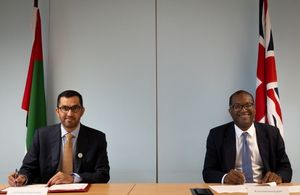Folic acid added to flour to prevent spinal conditions in babies
- Aim to avoid hundreds of potentially life-threatening spinal conditions in babies every year
- Adding folic acid to flour across the UK builds on 80 years of fortification and follows consultation with industry, stakeholders and the public
- The addition of folic acid to food has helped to reduce neural tube defects in a number of countries worldwide
Folic acid will be added to non-wholemeal wheat flour across the UK to help prevent life-threatening spinal conditions in babies, the Government and devolved administrations has announced.
Adding folic acid will mean foods made with flour, such as bread, will actively help avoid around 200 neural tube defects each year – around 20% of the annual UK total.
Non-wholemeal flour is already an established vehicle for fortification in the UK and the costs of fortification to industry are expected to be minimal.
The addition of folic acid to food has been a successful public health policy in a number of countries worldwide such as Australia, New Zealand and Canada, resulting in falls in neural tube defects.
Prime Minister Boris Johnson said:
Few things are as important as a baby’s health – and folic acid-fortified flour is a quick, simple win to enhance their development.
This will give extra peace of mind to parents and families, as well as helping boost the health of adults across the country.
Health and Social Care Secretary, Sajid Javid said:
We are committed to giving more children a healthy start in life. With the safe and taste-free folic acid baked into the national diet, hundreds more babies will be born healthy each year.
Focusing on preventing life-threatening health issues such as spina bifida, will ensure fewer people will require hospital treatment, and more individuals and families are able to live healthier lives.
The neural tube forms the early part of the brain and spine within the first 12 weeks of pregnancy – usually before the mother knows she is pregnant. Folic acid is the synthetic/man-made form of folate. Not getting enough folate (Vitamin B9) at this crucial time can lead to neural tube defects and result in spinal conditions such as spina bifida or anencephaly.
Folate helps the body make healthy red blood cells and is naturally occurring in certain foods, such as leafy green vegetables. Folic acid is already voluntarily added by food manufacturers to breakfast cereal, including some gluten free products, meaning people can usually get all they need from eating a balanced diet, but a higher intake is required in the first 12 weeks of pregnancy.
The NHS strongly recommends women who could become pregnant or are planning a pregnancy take a 400 micrograms folic acid tablet every day before pregnancy and until they are 12 weeks pregnant. This advice will continue, but with around 50% of pregnancies in the UK unplanned, the Government is taking action to increase folic acid intake nationally to help protect more babies, especially where a pregnancy is unplanned and supplements are not taken early enough.
Over 99% of British households buy bread and over a quarter of all groceries in the four biggest supermarkets contain flour, making adding folic acid to flour-based products a simple way to increase folate levels for tens of millions of people across the UK.
Since the Second World War, flour has been fortified with calcium, iron, niacin and thiamin during milling to support the nation’s health. Today’s announcement joins 80 countries, such as Australia, New Zealand and Canada, adding folic acid to staple food products to help reduce neural tube defects.
This public health decision is not anticipated to require major overhaul for industrial-scale flour producers. Folic acid will need to be added to the labelling of all foods made with flour – as is the case with other fortification.
Wholemeal flour and gluten free foods are not subject to mandatory fortification and these products are not in the initial scope of this policy. Wholemeal flour has more naturally occurring folate than non-wholemeal wheat flour, and some wholemeal and gluten free foods are already voluntarily fortified with folic acid in the UK.
Alex Waugh, Director of UK Flour Millers said:
Flour, whether white brown or wholemeal, is an ingredient in many foodstuffs and supplies a big proportion of our daily fibre and protein along with essential nutrients such as calcium, iron and B vitamins. If it is decided that folic acid should be added to flour for public health reasons, flour millers will do all they can to overcome any practical challenges to make it happen.
Kate Steele, CEO of Shine, the charity that provides specialist support for people whose lives have been affected by spina bifida and hydrocephalus, says:
Shine is delighted by the Government’s decision to support mandatory fortification of the most commonly-consumed flours in the UK with folic acid – a move we have campaigned for over thirty years.
Mandatory fortification of flour with folic acid will improve public health for so many, now and in the future.
In its simplest terms, the step will reduce the numbers of families who face the devastating news that their baby has anencephaly and will not survive. It will also prevent some babies being affected by spina bifida, which can result in complex physical impairments and poor health. This is truly a momentous day’.
A four nation review of Bread and Flour Regulations is being undertaken by officials in Defra, the Department of Health and Social Care, Food Standards Agency, and Food Standards Scotland. The implementation of the UK decision on the mandatory fortification of flour with folic acid will be included in this review.
The Office for Health Improvement and Disparities – launching fully on October 1st – will lead efforts to level up health disparities across the nation by supporting people of all ages, in all areas of the country, to live healthier lives and prevent illness.

